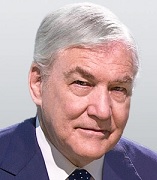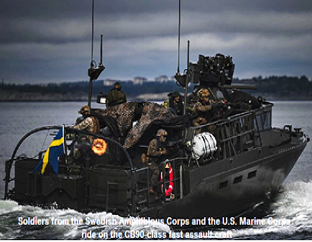 As we have just finished observing the 75th anniversary of NATO at the recent Washington summit, it is a good time to consider how that alliance could be renewed.
As we have just finished observing the 75th anniversary of NATO at the recent Washington summit, it is a good time to consider how that alliance could be renewed.
NATO must be considered the most effective alliance in the history of the world. No other multinational alliance involving a potential responsibility to go to war has endured so long, and none has been more successful. The purpose of NATO was to contain the Soviet Union; it did so successfully for 42 years until the USSR disintegrated without a shot being fired. Since the end of the Cold War, the alliance needs and purposes of the West have evolved considerably, and while there has been some flippant talk in some circles of disposing of NATO, a much better idea is to renovate and partly repurpose it.
The greatest strategic needs of the Western world now are to assist countries that may be under aggressive and unacceptable threats from China, Russia, Iran, and North Korea. Once the adequate levels of resistance against aggression or merely pressure from those countries are in place, and even as they are being established, the West will wish to bring the war in Ukraine to a satisfactory end and, with it, ensure that Russian attempts to unwind the Western victory in the Cold War and reintegrate into Russia by coercion republics, apart from Ukraine, that shall have departed from it, are adequately deterred by reinforcement. This will ensure that those republics can defend themselves and deter aggression against them of the kind that Russia inflicted upon Ukraine.
When these goals have been accomplished, it will be time to address separately the different countries that at the moment have arrayed themselves aggressively against the Western interest. The attempt of the People’s Republic of China to convert international waters adjacent to it into Chinese territorial waters and to intimidate the Philippines and other countries, as well as to strangle Taiwanese independence coercively, must be resisted. The attempt of the Russians to destabilize former Soviet republics and reassert themselves in what Russia calls “the near-abroad” must be met with different levels of resistance depending upon the country involved, but Russia must not be allowed to exercise an influence upon any of them that exceeds what may be reasonably determined to be its historic rights. This relates to Ukraine, the Baltic countries, and the Caucasus countries. Belarus is already a satellite, and the West is not concerned with the Muslim republics.
Similarly, Iran is the source of almost all of the remaining violence in the Middle East, and the Western interest—and in fact the world’s interest—would be served by an effective discouragement of that country’s continued subsidization of terror in the Middle East. North Korea is merely in need of substantive disincentivization of its reflexive tendency to sabre-rattle. It is a much weaker entity than the powerhouse of South Korea, as long as that country has an unambiguous guarantee of the nuclear protection, defensive and if necessary offensive, of the United States.
When these various activities of containment have been satisfactorily established and are operating effectively, the West’s next mission will be to propose something like a non-aggression pact between NATO and Russia, and gradually—by methods that do not demean the West or compromise our fundamental principles—present Russia with a strategic alternative more flattering and beneficial to it than its present rather demonstrative and histrionic embrace of China as a big brother. The West certainly possesses the ability to present Russia with a more attractive alternative, and one more respectful of Russia’s standing as a great but pre-eminently Western nation than China could offer. Obviously, we cannot do that while Russia is still attempting to subjugate Ukraine.
The Russian government has already indicated its peace terms, and while these are not acceptable, they may not be too far away from what can be achieved on the battlefield and retained, permitting a peace somewhat like that in Korea that follows the positions of the armies after a strenuous conflict.
The outline of such a peace would be that Russia would retain the Donbas region and a part of the Black Sea coast of Ukraine, but not Odessa, and that all of the people in what was Ukraine at the outset of this present conflict would then be free to move from Russia to Ukraine or vice versa for a period of a year and would be financially assisted in doing so. Thereafter, Russia and NATO would guarantee the revised frontiers of Ukraine, and Ukraine would begin procedures for entering NATO. It would be understood that any resumption of the Russian attempt to conquer Ukraine would involve it in war with all of NATO. Some provisions might have to be made for Russian-speaking minorities in the Baltic republics and traditional Russian provinces of Georgia.
This combination of agreements—culminating in a formal peace agreement between Russia and all of NATO with the prospect of supplementary agreements on economic and other matters—would greatly enhance the cause of durable peace in the world and would be a decisive step in extending the Western world across Eurasia.
Regarding the Israel-Hamas conflict, the U.S. government will need to assist Israel much more unambiguously than it has been in crushing the Hamas terrorist operation and, if need be, Hezbollah and the Yemenese Houthis. Unless a sensible comfort level can be achieved about Iranian nuclear military capabilities, the United States, preferably with some Arab allies, would do the world a considerable service in eliminating militarily Iran’s capacity to deliver nuclear warheads outside its own borders. This is not a challenge that the armed forces of the United States would find difficult to accomplish, and the Arab world would rejoice in that.
As these goals were being pursued, the North Atlantic Treaty Organization, which now includes countries far from the Atlantic such as Greece and Turkey, should be reconfigured as a worldwide defensive alliance of acceptably democratic countries and the countries that, while not democratic, are inoffensive to the democracies and eligible partners for alliance cooperation. This was essentially the status of Spain, Portugal, and even Greece and Turkey in NATO for many years. Thus, Israel and the countries in the Middle East that had made their peace with Israel could be admitted. So could India, Indonesia, the Philippines, Australia, New Zealand, Singapore, Japan, South Korea—and Thailand if it was interested and not too preoccupied with continuing its masquerade as the Switzerland of the Far East—and possibly even Vietnam.
Special arrangements could be made with Taiwan that don’t violate the Nixon-Chou En-lai agreement at Shanghai in 1972. A number of Latin American countries would be eligible but possibly not interested since South American frontiers are not much disputed. The more internationally ambitious countries among them, such as Mexico and Brazil, might seek membership in a renamed and somewhat repurposed NATO. With Saharan and sub-Saharan Africa, we would have to tread warily.
Such an organization as described, renamed to extend far beyond the North Atlantic, could become a mightier force for peace than NATO has been. Such an alliance, if entered into seriously by this expanded membership, would seriously restrict the practical ability of China, Russia, and Iran to disturb the world and threaten their neighbours. In Russia, the Western emulators generally prevail over the nativists as long as Russia is treated with respect in the West. Aggression like that in Ukraine is the final test of the extent to which Russia can regain any of the ground that it lost when the Soviet Union disintegrated. The Russian public does not like the Ukraine war and it certainly prefers the West to China. The Iranian population has suffered miserably under the totalitarian theocracy that succeeded the Shah. An airtight regime of sanctions and, if necessary, a military assault on its nuclear program could ultimately produce regime change in that country.
All of this constitutes a useful and attainable set of goals as NATO moves towards its centenary. It has been a splendidly successful alliance, and there is no reason why it cannot become a much larger community of kindred nations, unchallengeably capable of collective self-defence.
Originally published by New English Review
** Conrad Black was one of the leading newspaper publishers in the world. He’s the author of authoritative biographies of Franklin D. Roosevelt and Richard Nixon, and, most recently, “Donald J. Trump: A President Like No Other.”
Comments powered by CComment